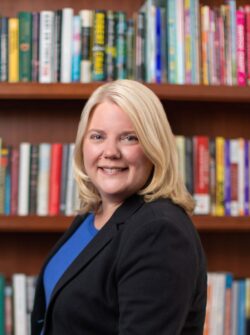Experienced professionals enter executive MBA (EMBA) programs at the University of Tennessee, Knoxville’s Haslam College of Business for a variety of reasons, but the programs’ networking opportunities are an especially significant draw. Student executives trade new insights into their industries and tips on workplace dynamics, management and leadership while building a peer group to call on after graduation. Two alumni of Haslam’s Executive MBA – Global Supply Chain (EMBA-GSC) exemplify the advantage of networking in the executive education programs.
Advice Among Equals

Kinga Stube
Kinga Stube, senior director of global planning and logistics at SC Johnson, and Annette Danek-Akey, Penguin Random House’s executive vice president and chief supply chain officer, found common ground through three elements of the EMBA-GSC program. The peer advisory group, 360-degree feedback and team projects encouraged the students to bond, assisting one another and learning from each other’s expertise. Danek-Akey and Stube shared ideas on best practices and other subjects with each other and other members of the cohort.
“Annette has a different leadership style than I do,” Stube says. “We would leverage each other’s strengths to approach certain situations differently. If you keep approaching a problem the same way all the time, you will always get the same result. To solve it, you must sometimes change the way you look at it.”

Annette Danek-Akey
Danek-Akey’s company promoted her to her current position during the program, requiring her to move to the United Kingdom. Stube, who recently moved to the U.S. from Switzerland, advised her classmate on relocating to Europe, while Danek-Akey helped Stube with networking in the U.S.
Post-Graduation Benefits
After graduation, Danek-Akey, Stube and others from their cohort formed a WhatsApp group of about 20 members, keeping abreast of each other’s activities, both professional and personal. Both executives say they continue to consult with one other and their classmates on work-related projects. Stube and Danek-Akey agree that peer networking is a worthy asset of the EMBA-GSC program.
“Over the course of the year, I got to understand what was different or unique with their supply chains versus our supply chain,” Danek-Akey says. “So, if there’s something that I’m wondering about, I have a group of people I can ask.”
Peer Bonds Are Vital
Amy Cathey, associate dean for graduate and executive education, says fruitful networking experiences are the norm for Haslam EMBA students since peer-to-peer interaction is an emphasized component of the college’s EMBA programs.
“We cater to leaders in their fields,” she explains. “A fundamental element of the program is meeting other leaders and learning how they approach industry opportunities and challenges. So, peer-to-peer networking and coaching figure prominently in classmates’ leadership growth. Alumni tell us relationships they form with their classmates are a vital part of the program, lasting long after graduation.”
Faculty-Alumni Rapport
The advantages of networking in the Haslam EMBA programs aren’t limited to peers. Cathey notes that faculty relationships also have a significant influence.
For Stube, faculty played an important role during her EMBA-GSC experience, sparking conversations and initiating knowledge sharing.
“They frame the problem and facilitate the connection, so that we can take it to the next level via talking about it and having those breakthrough ideas,” Stube says. “I think everybody had some ‘Aha!’ moments during the program.”
Faculty are still a resource for Danek-Akey, who explains, “Having met all these professors at UT, you know their research and where their passions lie. It’s easy now to reach out and say, ‘Hey, here’s a little question.’”
Tom Goldsby, co-executive director of the Global Supply Chain Institute and Dee & Jimmy Haslam Chair in Logistics, says faculty stay in touch with alumni because they take great pride in their graduates and what they accomplish for their organizations and beyond. Maintaining contact with EMBA alumni is beneficial for the faculty, too, he adds.
“We, as faculty, are lifelong learners,” he says. “We are afforded front-row seats to ride along with students in their careers, witnessing their challenges and successes and learning from their circumstances. We use this learning in our research to motivate new initiatives and to elevate dialogue in the classroom.”
Making the Connection
Stube and Danek-Akey recommend supply chain executives seeking an MBA consider Haslam’s EMBA-GSC. Stube emphasizes its utility to professionals from outside the U.S.
“This program can be beneficial to professionals from other regions who are working and doing business with U.S. It helped me to understand American business culture,” Stube explains. “I would also encourage UT to go outside of the U.S. when recruiting new students. Supply chain is global, so it makes sense to bring perspective from different countries.”
“When I started my Global Supply Chain MBA, I had no idea I would be moving to the UK a month after graduating from the program” Danek-Akey says. “When my goal of leading a global network at Penguin Random House became mobilized, I felt well prepared after my Haslam experience. I am thankful to Kinga, my fellow classmates and the faculty for their support and guidance throughout the program and beyond.”
Danek-Akey recommends the program because of how it served her in her career. For example, Alcott Global recently named her one of its top 30 leaders in the global supply chain industry. For this and more, Danek-Akey gives a nod to her experience in Haslam’s EMBA-GSC program.
—
CONTACT:
Scott McNutt, business writer/publicist, rmcnutt4@utk.edu

